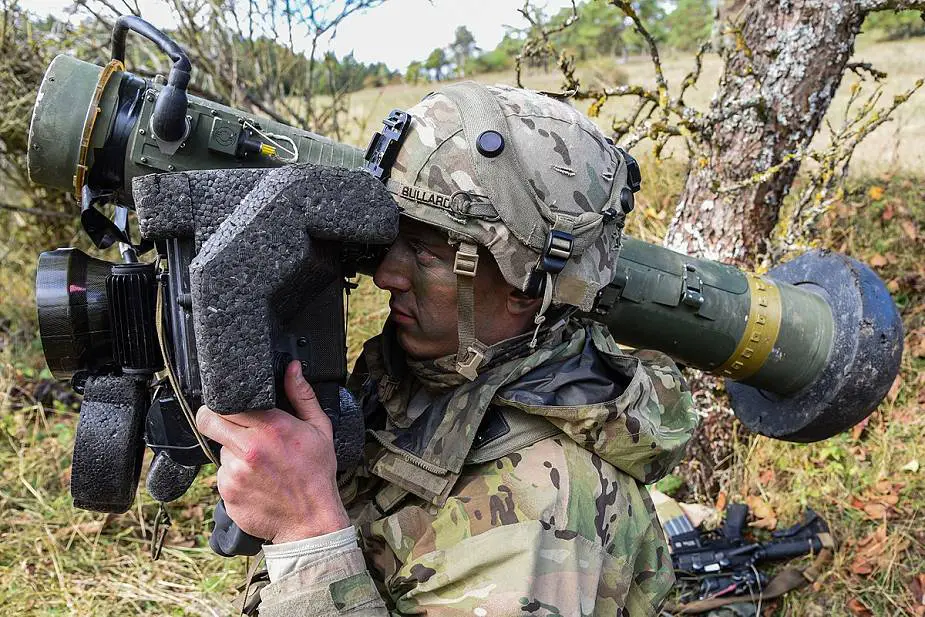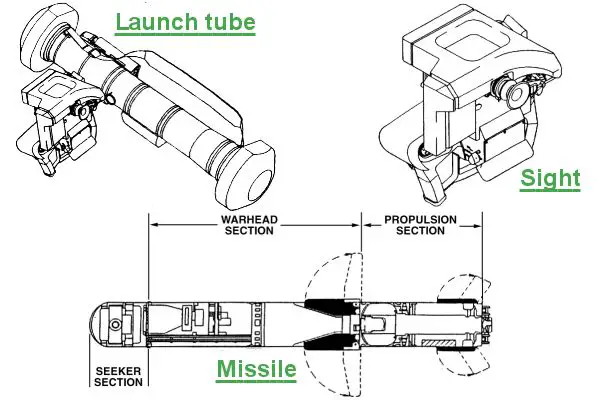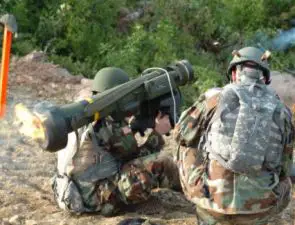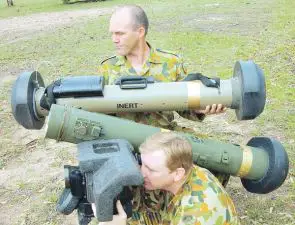FGM-148 Javelin
Javelin FGM-148 Missile - Lockheed Martin
Anti-tank infrared guided missile - United States

Description
The Javelin missile system was developed and is built by a joint venture formed by Raytheon and Lockheed Martin. The FGM-148 Javelin is an American-made man-portable anti-tank guided missile and employable fire-and-forget medium-range missile system. The compact, lightweight Javelin is ideally suited for one-soldier operation in all environments. The Javelin has been combat-proven in Afghanistan and Iraq by U.S. and allied soldiers, Marines and Special Forces. Eleven countries have selected Javelin to meet anti-armor requirements. The Javelin has secondary capabilities against helicopters and ground-fighting positions. Its direct-attack capability will engage targets with an overhead cover or in bunkers. Its "soft launch" allows employment from within buildings and enclosed fighting positions. The soft launch signature limits the gunner's exposure to the enemy, thus increasing survivability. French Army instructors launched their first U.S. Javelin missile for practice at the Canjuers base, a step forward in plans to rapidly deploy the weapon in the Afghan theater, a U.S. official said and the French Army has confirmed. In June 2019, American Company Oshkosh Defense, LLC, an Oshkosh Corporation company, along with several industry partners, participated in a successful Javelin anti-tank missile flight test from a Kongsberg remote weapon station on a Joint Light Tactical Vehicle (JLTV) at the Redstone Test Center in Redstone Arsenal, Alabama. In March 2020, the U.S. State Department has made a determination approving a possible Foreign Military Sale to Poland of one hundred eighty (180) Javelin missiles and seventy-nine (79) Javelin Command Launch Units (CLUs). Following the crisis in Ukraine, in February 2022, Estonia has delivered Javelin anti-tank missiles to Ukraine.
Javelin FGM-148 main variants:
- FGM-148A: initial version of the Javelin.
- FGM-148B: an improved version of the Javelin.
- FGM-148C: a further improved version of the Javelin.
- FGM-148D: export version of the Javelin.
- FGM-148F: fitted with a multi-purpose warhead. It is much more effective against enemy personnel, weapon crews, buildings and lightly armored or unarmored vehicles. This missile is still lethal against tanks.
Technical Data
| Firing Unit |
|
The Javelin system consists of the CLU (Command Launch Unit) and the missile. The CLU, with a carry weight of 6.4kg, incorporates a passive target acquisition and fire control unit with an integrated day sight and a thermal imaging sight. The gunner's controls for the missile system are on the CLU. The day sight is equipped with x4 magnification and the night sight with x4 and x9 magnification optics. The Javelin command launch unit then sends a lock-on-before-launch signal to the missile. With its soft-launch design, Javelin can be safely fired from inside buildings or bunkers.
|
| Missile |
|
The Javelin missile’s tandem warhead is a high-explosive antitank round. This round utilizes an explosive-shaped charge to create a jet of superplasticity deformed metal formed from trumpet-shaped metallic liners. The result is a high-velocity jet that can penetrate armor equivalent to 600 to 800 mm RHA (Rolled Homogeneous Armor). The Javelin missile has a maximum range of 2,500 m using fire-and-forget missile with lock-on before launch and automatic self-guidance. The missile has an effective firing range of 4,000 m for the lightweight LCU. It has a maximum firing of 4,750 m when the missile is fired from a vehicle weapon station.
|
| Combat Use |
| The missile has a small thermal imaging TV camera in the nose and a computer that is sufficiently sophisticated that once locked onto a tank, it will follow it autonomously, even if it is moving. The missile is designed to attack the topside of a tank where the armor is thinner. After launch, the missile climbs to a 330-660 ft altitude and dives at a 45-degree angle. The warhead is a tandem shaped charge for penetrating explosive reactive armor. The first charge detonates the armor and the second penetrates the vehicle. The Javelin can defeat any known enemy armor. Javelin’s long-wave IR seeker enables it to engage in obscurants and reduced visibility and resists countermeasures. Its versatility makes it effective against tanks, bunkers, buildings, small boats, and slow-moving helicopters. It is adaptable to many platforms, including tripods, trucks, light armored vehicles, and remotely piloted vehicles. |
| Accessories |
| The first view is a 4× magnification day view. It is mainly used to scan areas for light during night operation because the light is not visible in the thermal views. The second view is the 4x magnification night view and shows the gunner a thermal representation of the area viewed. This is also the primary view used due to its ability to detect infrared radiation and find both troops and vehicles otherwise too well hidden to detect. The third view is a 9x magnification thermal view. This process is similar to the automatic zoom feature on most modern cameras. |
Specifications
| Type of missile | Weight Missile |
| Anti-tank guided missile | 11.8 kg |
| Country users | Diameter Missile |
| Australia, Bahrain, Czech Republic, Estonia, France, Georgia, Indonesia, Ireland, Jordan, Libya, Lithuania, New Zealand, Norway, Oman, Poland, Qatar, Saudi Arabia, Taiwan, Ukraine, United Arab Emirates, United Kingdom, and the United States. | 126 mm |
| Designer Country | Length Missile |
| United States | 1.08 m |
| Operators | Range Missile |
| Two soldiers | 2,500 to 4,750 m |
| Accessories | Warhead |
| Imaging infra-red and Magnification 4x day and 4x or 9x thermal | Tandem shaped charge |
| Guidance | Weight Firing Post |
| Passive target acquisition/ fire control with integrated day/thermal sight | 6.4 kg |
Details View
 |
|
 |
 |
Pictures - Video

























